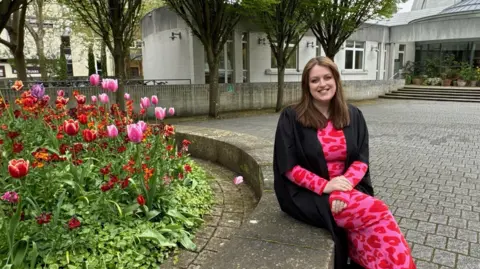 Jen Moore
Jen MooreA woman whose endometriosis went undiagnosed for more than two decades says a school’s toughened stance on period pain is “just another slap in the face” for women and girls.
Neal-Wade Academy in March, Cambridgeshire, told parents earlier this month that it would only authorise sick days for period pain if it was given “medical information relating”.
Jen Moore, 35, who grew up with severe period pains, said she felt “angry, infuriated and heartbroken” about the school’s policy and has offered to speak to them about menstrual health awareness.
Neal-Wade Academy said its policy was in line with statutory guidance on absences and that the school prioritised student wellbeing.
‘Without stigma’
Charities and campaigners like Mrs Moore have called on the school to rethink its policy.
Endometriosis UK said it would be writing to the school to seek “reassurance” that pupils experiencing period pains would not be classified as unauthorised absences.
Jo Campion, its public affairs adviser, said: “Period pain that impacts day-to-day life, including causing absences from school, can be a symptom of endometriosis and other menstrual health conditions, and must be taken seriously.”
The support group, National Endometriosis Survivors, has called for the school to reconsider its policy, as well as the charity Bloody Good Period, which said: “Education is important, but so is a student’s right to manage their period health without stigma or scrutiny.”
 Jen Moore
Jen MooreMrs Moore, from Papworth Everard, Cambridgeshire, was diagnosed in 2022 with endometriosis and adenomyosis, which are similar but separate conditions where womb tissue grows in other places, causing painful periods and heavy bleeding.
“On my very first period I was curled up on the floor of my parents’ bedroom, screaming, unable to straighten my spine,” she said.
Mrs Moore said she routinely missed school “one or two days” a month.
“I would drag myself in otherwise, on codeine, with heat patches plastered all over my body,” she added.
She said her school was understanding but did not know the extent of her condition.
“One teacher asked me if I was okay, as they thought I looked like a vampire as I was so pale from blood loss,” she said.
Mrs Moore said she went to her GP several times during her teens but was told “time and time again that it was normal”.
‘Reliable narrator’
She has since had two operations to relieve her symptoms, and is due to have another.
Mrs Moore said she thought girls were “speaking up” about period issues more than when she was younger, but that the school’s policy “plunge[d] menstrual health backwards”.
She said: “No doctor would have validated my symptoms enough to give me proof of painful periods, I was just sent away.
“We’re telling girls their word is not good enough to be a reliable narrator of their own experience, when we need to just start believing them.”
Endometriosis UK said it takes an average of eight years and 10 months to get a diagnosis for the condition.
The NHS advises seeing a GP if periods become more painful, heavier or irregular.
Graham Horn, the principal of Neal-Wade Academy, said its sickness policy was in line with guidance from the Department for Education (DfE).
He said: “We are implementing changes to our attendance policies including how student absence is reported to the school.
“We appreciate the cooperation of parents and carers as we work together to ensure the best educational outcomes for all our students.”
The DfE said its guidance to schools advised a “support-first approach” to pupil absences.
A spokesperson said: “Decisions on how to record attendance are down to individual schools but decisions must be made in line with statutory guidance.
“That means that if a pupil is too unwell to attend school, their absence must be recorded with an authorised absence code in the register.”
